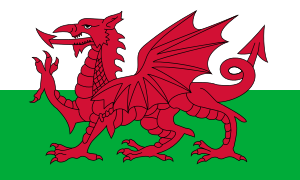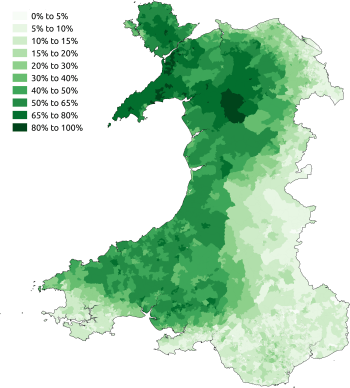Languages of Wales
| Languages of Wales | |
|---|---|
| Official languages | Welsh (19%),[1] English (99%)[2] |
| Main immigrant languages | Urdu, Somali, Cantonese, Polish, Irish |
| Main foreign languages |
French German Italian Spanish |
| Sign languages | British Sign Language |
| Common keyboard layouts |
|
| Part of a series on the |
| Culture of Wales |
|---|
 |
| History |
| People |
|
Traditions
|
|
Mythology and folklore |
| Religion |
| Art |
|
Music and performing arts |
|
Monuments |
|
The two official languages of Wales are Welsh and English.[3] Both languages are constituted as working languages of the National Assembly,[4] however Welsh is further recognised in law as having "official status",[5] making it the sole de jure official language in any part of the United Kingdom. The majority of the population of Wales is able to speak English, while Welsh is spoken by approximately one-fifth of the population.
Geographical distribution
English is widely used throughout the country and is the native language of most people in the South and the North East of the country; in the West and North, Welsh is the dominant native language. Nevertheless, there are a number of communities throughout the country to which these generalisations do not apply. For example, despite being located in the overwhelmingly English-speaking city of Swansea, 45% of Mawr's residents speak Welsh as their native language.
According to the 2011 census, Welsh is spoken by 19% of the population and English is spoken by 99% of the population.[1][2]


Welsh English
Welsh English or Anglo-Welsh is the distinct form of English used in Wales.
Aside from lexical borrowings from Welsh like bach (little, wee), eisteddfod, nain and taid (grandmother and grandfather respectively), there exist distinctive grammatical conventions in vernacular Welsh English. Examples of this include the use by some speakers of the tag question isn't it? regardless of the form of the preceding statement and the placement of the subject and the verb after the predicate for emphasis, e.g. Fed up, I am or Running on Friday, he is[6]
In South Wales the word "where" may often be expanded to "where to", as in the question, "Where to is your Mam?". The word "butty" is used to mean "friend" or "mate".[7]
There is no standard variety of English that is specific to Wales, but such features are readily recognised by Anglophones from the rest of the UK as being from Wales, including the (actually rarely used) phrase look you which is a translation of a Welsh language tag[6]
Welsh Romani
Welsh Romani (or Welsh Romany; sometimes also known as Kååle[8]) is a variety of the Romani language which was spoken fluently in Wales until at least 1950.[9] It was spoken by the Kale group of the Romani people who arrived in Britain during the 15th century. The first record of Gypsies in Wales comes from the 16th century. Welsh-Romani is one of the many Northern Romani dialects.[10]
This dialect of Romany includes some loanwords from Welsh, but little now remains of it.
Sign languages
Wales' deaf community tends to use British Sign Language. There are a few signs used in Wales which are unique to that country, but these tend to be regionalised rather than national.
Other sign languages in use in Wales include Makaton, and Signed English, a sign language based on the English language.
Norman French and Latin

Latin is also used to a limited degree in certain official mottos, legal terminology (habeas corpus), and various ceremonial contexts. Latin abbreviations can also be seen on British coins. The use of Latin has declined greatly in recent years. At one time, Latin and Greek were commonly taught in British schools [11]), and A-Levels are still available in both subjects.
In rare cases, Norman French and Latin have contributed to Welsh toponymy e.g. Beaumaris (Biwmaris), Grace Dieu, Strata Florida and Valle Crucis. The Welsh language prefix Caer- is a corruption of the Latin castra (often rendered as -chester/-caster in England). Both of the placename elements in Caerleon come ultimately from Latin. Latin has had a significant influence on Welsh in words such as ffenestr and pont, meaning window and bridge respectively.
Notable Welsh writers in Latin include Geoffrey of Monmouth, who wrote Historia Regum Britanniae, and Adam of Usk, author of Chronicon Adæ de Usk; and notable texts include Annales Cambriae.
Immigrant languages

People migrating to Wales in recent decades have brought many more languages to the country.
South Asians in the United Kingdom speak dozens of different languages, and it is difficult to determine how many people speak each language alongside English. The largest subgroup of British Asians are those of Punjabi origin (representing approximately two thirds of direct migrants from South Asia to the UK), from both India and Pakistan.
There is a long established Somali community in Cardiff, and Irish speakers have been coming and going from Wales for many centuries. There are Irish communities in most industrial areas, plus Holyhead, Swansea and Cardiff.
Other languages
J. Gwyn Griffiths has commented that "I can say with certainty that there were Cornish immigrants who spoke the language in the leadmine villages of North Cardiganshire, Mid-Wales, in the 1850s".[12]
See also
References
- 1 2 QS206WA - Welsh language skills, ONS 2011 census. Out of the 2,955,841 residents of Wales over the age of three, 562,016 (19%) can speak Welsh. Retrieved 20 July 2015.
- 1 2 QS205EW - Proficiency in English, ONS 2011 census. Out of the 2,955,841 residents of Wales over the age of three, 2,936,536 (99%) can speak English "well" or "very well". Retrieved 20 July 2015.
- ↑ Official Languages Scheme, July 2013, Assembly Commission. Retrieved 20 September 2016.
- ↑ National Assembly for Wales (Official Languages) Act 2012
- ↑ Welsh Language (Wales) Measure 2011
- 1 2 Crystal, David (2003). The Cambridge Encyclopedia of the English Language Second Edition, Cambridge University Press, pp. 335
- ↑ "Why butty rarely leaves Wales" by Claire Hill at walesonline
- ↑ ROMLEX: Romani dialects
- ↑ Price, Glanville (2000) Languages in Britain and Ireland, Blackwell Publishers, Oxford.
- ↑ Norbert Boretzky: Kommentierter Dialektatlas des Romani. Wiesbaden: Harrassowitz, 2004 p. 18
- ↑ Bryn Mawr Classical Review 98.6.16. Ccat.sas.upenn.edu. Retrieved on 2011-03-17.
- ↑ "Review of The Wheel An anthology of modern poetry in Cornish 1850-1980". Francisboutle.co.uk. Retrieved 2013-04-23.